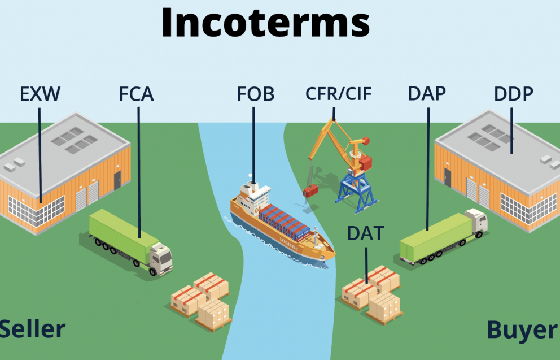Incoterms

It is then important to make important agreements with the business partner
about the transport of the cargo.
That is why it is important to agree on an Incoterm in advance.
There are a number of different Incoterms, each with its own obligations
for the seller and the buyer.
Each Incoterm tells the exact division between the obligations of the seller
and the obligations of the buyer of the goods.
What is an Incoterm
Incoterms stands for international commercial terms. They are standard international agreements regarding all costs and risks of the transport
of goods and also describe the rights and obligations. The Incoterms describe the responsibilities of exporters and importers in the handling of
shipments and the transfer of liability at various stages of the respective transaction.
There are many different types of costs involved in (international) trading. Consider the costs of transport,the costs of loading and unloading the
goods, taxes for importing and exporting goods and any insurance.
It differs per Incoterm which party is responsible for which costs.
The latest version dates from 2020.
EXW - Ex Works
- In EXW, the buyer is responsible for almost all the transportation process and cost
- The seller ensures that the goods are available to the buyer
- The transfer of risk takes place at the seller's premises where the buyer collects the goods
FCA - Free Carrier
- With FCA, the seller is responsible for delivering the goods to the buyer's carrier
- The seller takes care of all costs and documents for exporting the goods
- The transfer of risk takes place at the moment that the carrier of the buyer receives the goods.
CPT - Carriage Paid To
- With CPT, the seller is responsible for arranging the transport up to the buyer's carrier
- The seller takes care of all costs and documents for exporting the goods
- The transfer of risk takes place when the goods have arrived at the first carrier.
CIF - Cost Insurance and Freight
- With CIF, the seller is responsible for delivering the goods on board the agreed ship
- The seller pays for this transport and is obliged to arrange insurance with at least a minimum cover
- The transfer of risk takes place as soon as the goods have been delivered to the ship.
FOB - Free On Board
- With FOB, the seller is responsible for delivering the goods on board the agreed ship
- The seller takes care of all costs and documents for exporting the goods
- The transfer of risk takes place as soon as the goods have been delivered to the ship.
FAS - Free Alongside Ship
- With FAS, all risks and costs of transport are for the seller until the goods are delivered next to the agreed ship on the quay
- From that moment on, the buyer is responsible for the goods and their further transport
- The transfer of risk takes place at the moment the goods are delivered next to the ship by the seller
CFR - Cost and Freight
- With CFR, the seller is responsible for delivering the goods on board the agreed vessel
- Once the goods are on board, the buyer bears all responsibilities for the goods and the rest of the transport
- The transfer of risk takes place as soon as the goods are on the ship.
CIP - Carriage And Insurance Paid
- With CIP, the seller is responsible for arranging transport to the agreed destination
- The seller is obliged to take out insurance
- The transfer of risk takes place as soon as the goods have arrived at the buyer's carrier.
DAP - Delivered At Place
- At DAP, the seller is responsible for the transport and the costs thereof
- The seller arranges everything related to the export of the goods
-The buyer is responsible for import clearance and any applicable local taxes or import duties.
- The transfer of risk takes place as soon as the goods are ready for unloading at the destination.
DPU - Delivered At Place Unloaded
- With DPU, the seller is responsible for the entire transport process and costs
- The seller is also responsible for unloading the goods at the agreed destination
- The transfer of risk takes place as soon as the seller has unloaded the goods at the place of destination
DDP - Delivered Duty Paid
- With DDP, the seller is responsible for the transport and the costs thereof
- The seller also bears the risk during the transport of the goods
- The transfer of risk takes place as soon as the goods are ready to be unloaded at the destination.
- The seller is responsible for arranging delivery of the goods at the named place
- The seller is also responsible for customs formalities (import and export documents) and all applicable taxes and duties paid
Since the buyer is only responsible after unloading the cargo, there is not really a transfer of risk
or the critical point.As indicated, it can be difficult for the buyer to unload exactly at the right time at
the destination, so this can be seen as the critical point when using DDP as Incoterm.
It is therefore important to communicate the resources required to unload properly as a seller in order to prevent problems.
